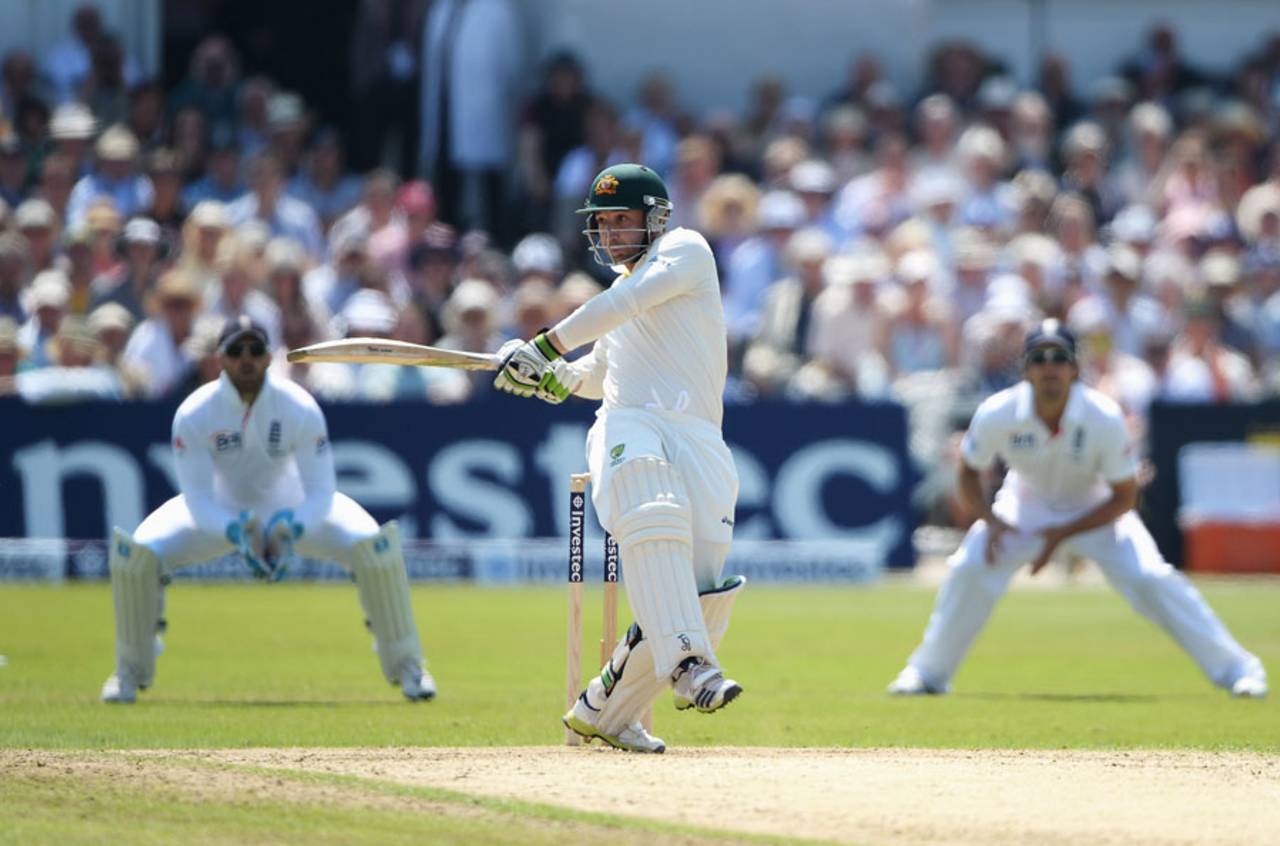Losing Phil Hughes
He was a magical player when he made his Test debut, but the establishment's orthodoxy, confusion and fear have reduced him to a shadow of his old self
Jon Hotten
21-Aug-2013

Phil Hughes' career is a cautionary tale of Australia losing trust in itself • Getty Images
At the start of the 2009 season, on a rare foray into actual cricket journalism, I went to Middlesex's pre-season press conference at Lord's. It was packed with chattering hacks, enticed not by the opening of the county championship but the presence of Andrew Strauss, giving his first interviews of an Ashes season, and the introduction of Angus Fraser's latest signing, a kid from a banana farm in New South Wales, who, in between inking his contract and arriving in a chilled and grey England, had made a sensational entry into Test cricket in South Africa. He had shrugged off a four-ball duck in his debut innings to make scores of 75, 115 and 160 in his next three, and had dismantled a bowling attack that consisted of Steyn, Ntini, Morkel and Kallis in their own backyard with a series of unconventional and thrilling assaults.
It was no surprise. His life had been filled with such success: he scored 141 not out on his grade debut in Sydney, made 51 and 137 for New South Wales seconds to ensure a first-class debut where he'd got 51, and then scored a match-winning hundred in his first Pura Cup final. He was on the endless upward curve of the great player.
Phil Hughes came into the room. He was tiny, with one of those faces that might have been staring at you in sepia from a bygone age. His eyes were sharp and bright. He had presence, X-factor, star quality. It was like looking at a young racehorse.
During a green and wet springtime, he batted five times for Middlesex in the Championship, made three hundreds and two fifties and averaged 143.50. A country kid from rural New South Wales with a technique all of his own and a fresh and rapid eye… Well.
Three Test match innings later, after scores of 36, 4 and 17, with his average still above 50, Hughes was dropped by Australia for the first time. At the root of this decision was fear. Fear that the way he batted was not suited to Test cricket, fear that the Ashes might be lost, fear that the Australian era was coming to an end.
The corrosive quality of fear has reduced Phil Hughes. When I see him bat now, he is a shadow of the player who carved apart almost every bowler he faced for the first 20 years of his life. When I see him speak, he is nervy, diminished, deferential. The sharp glare in his eye has gone. He doesn't open the batting anymore. He is 24 years old and might be changed irrevocably. No one is asking why.
He was, like Bradman, a country boy coming out of nowhere, defying convention. Where The Don picked the bat up differently, Hughes ignored one of the immutable laws of batting and stayed leg side of the ball, from where he carved and sliced through the off side and mowed down the ground like Nadal hitting a low forehand. Even in an age at ease with unorthodoxy Hughes was too much, and yet it was unorthodoxy that made him devastating, that set him apart.
The great and unmentioned facet of the way he played was that staying leg side of the rising ball had always been, in the accomplished batsman, a mark of cowardice. The only reason for not getting into line was a fear of being hit. That wasn't why Hughes did it, but he was fighting a century's worth of conventional wisdom, and almost subconsciously it played into a wider notion that he would have to reinvent his technique if he was to succeed as a Test match player.
The weird magic that Phil Hughes possessed has all but perished in the effort to do so.
He went to his first Test hundred with consecutive sixes. Fear was not in his mind then. Fear is everywhere now.
To a greater or lesser extent, every player gets found out, worked out, worked over. For the best, this happens at Test level because it's the only standard high enough to do it. Nothing unexpected happened to Phil Hughes. What's shocking is how quickly he was first discarded and how completely his methods were written off. Orthodoxy has laid low something special. Hughes was an extraordinary sight, an outlier, and that has been lost in the doubt and confusion of his coaches.
Before technique, cricket is a game of hand-eye co-ordination, something given its perfect iteration by Virender Sehwag's irreducibly brilliant "see ball, hit ball". Great players from Bradman to Sehwag have understood this and played the game their way, shifting its parameters to accommodate their vision. Their faith in the way they did what they did was never undermined.
Hughes is a paradigm for Australian cricket, which no longer trusts itself. He should be burning with anger at what has been taken away, and use that anger to fuel a return to what he was. He has nothing more to lose now.